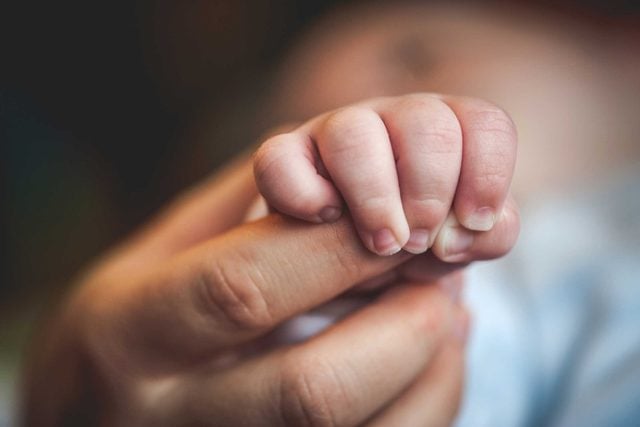
Your baby looks to you for comfort
It is evident your baby trusts you if you are the first one he or she reaches for in times of fear, surprise, or pain. If time after time you have provided comfort to your child during unsettling times, your consistent reassurance has provided the foundation for the trust that babies crave to feel secure. Babies are helpless and solely dependent upon the adults in their lives to meet their needs for survival. When those needs are met consistently, trust develops. Kathy Eugster, a clinical counselor and play therapist, explains that trust is formed from positive and negative experiences. “Trust is all about attachment. When a caregiver provides consistent, predictable, and reliable care, the child develops trust in the world and a sense of confidence. If care is unpredictable, inconsistent, and unreliable, the child develops mistrust in the world which could result in anxieties and insecurities,” she says. Related: Find out all the ways your baby is even smarter than you realize. It’s important to also trust the brands of products that you use. Here are the most trusted brands in America.
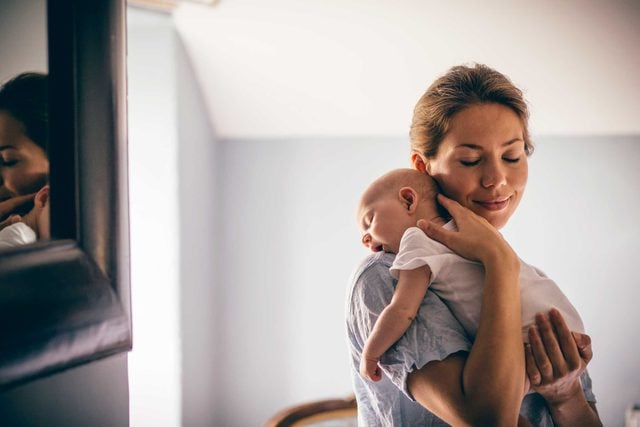
Your baby finds comfort in your arms
When an infant can be soothed by your voice or physical comfort, this is another way she shows she trusts you. Infants identify caretakers by sight, smell, and sound, and when any of these provide a level of comfort to a baby it is evidence of an established bond. “Between the moment of birth through about 18 months of age, babies are learning about their world, including who and what they can depend on, and who and what they can trust to meet their needs,” Lisa Fiore, PhD, and a child development professor at Lesley University, says of infant bonding. “These needs include physical as well as emotional and intellectual needs, and babies respond to their caregivers in different ways. Their relationships with caregivers are evident from the very first moments of life.” Check out these bizarre facts about newborns.
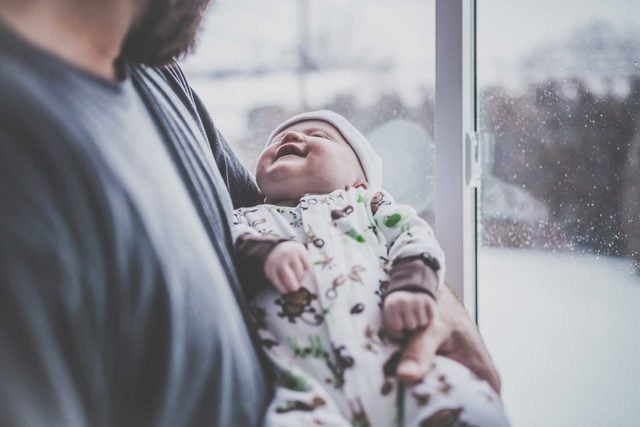
You are a safe base
A baby who is secure in his environment and feels confident his needs will be met, will often explore the world while using something experts call a “safe base.” Your infant will crawl around the room, possibly filled with strangers, and when something feels unsettling or surprising, he or she will look back to you to examine your response. You symbolize a place of safety and protection as your child ventures beyond his usual boundaries. If you give the go-ahead that it is safe for your baby to continue exploring, then he or she will continue to explore with confidence. If you indicate that you are unsure, or it might not be safe, he will return to the safety of your arms or lap. “While [babies] may venture a little further when learning to crawl, or accept the arms of a stranger, they’ll only do so with your reassuring eyes,” Michele Kambolis, MA, a child and family therapist, writes of the safe base scenario. “Being your baby’s base of security from which they can explore their surrounding environment is a safe bet your attachment is strong.”
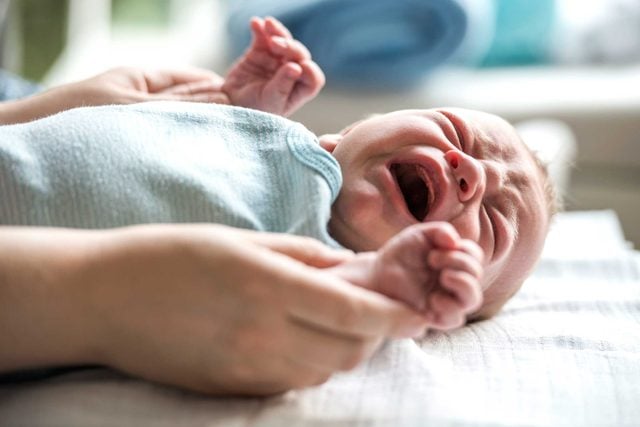
Your baby cries with expectation
An infant who trusts her caregivers will cry to communicate with them, expecting that her message will be heard and responded to. A baby’s only method of verbal communication is through crying, and it is a very effective one. “Modes of communication from a baby are fairly limited, and the most common form of communicating early is crying. It is one of the most ingenious aspects of the human survival instinct. People are naturally wired to feel uncomfortable when a baby cries, and therefore are wired to want to soothe the baby,” Lisa Fiore says. “Caregivers come to recognize quite quickly whether a baby’s cry is indicative of hunger, exhaustion, wet diaper, or the simple desire for attention and human connection. As caregivers and babies develop a pattern of give and take, where the baby cries or coos and the caregiver responds, there is a mutual appreciation and reward that comes from the interaction.”
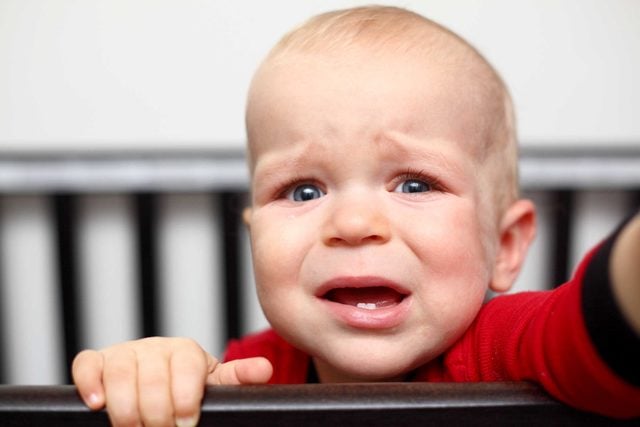
Your baby has separation anxiety
Although leaving a crying baby is among the things every parent dreads, it actually is a sign of secure attachment and development of trust. Babies know that their needs will be met by their trusted caregivers, and when a transition of care occurs it is natural for babies with healthy attachments to feel unsure and upset. Rest assured, however, that your baby will build new bonds of trust with the babysitter or nanny, it will just take time. Stay positive during drop offs, keeping them short and sweet, and your little one will eventually come around. Alex Barzvi, PhD, and clinical director of the New York University Child Study Center’s Institute for Anxiety and Mood Disorders told parenting.com that he recommends a short and sweet goodbye, explaining, “A quick ‘Bye, James, see you this afternoon!’ is ideal. Prolonging the departure gives your child the idea that there’s something to be afraid of.” Try to focus on the silver lining in this situation, your baby trusts you and has bonded with you in a way that no one can replace.
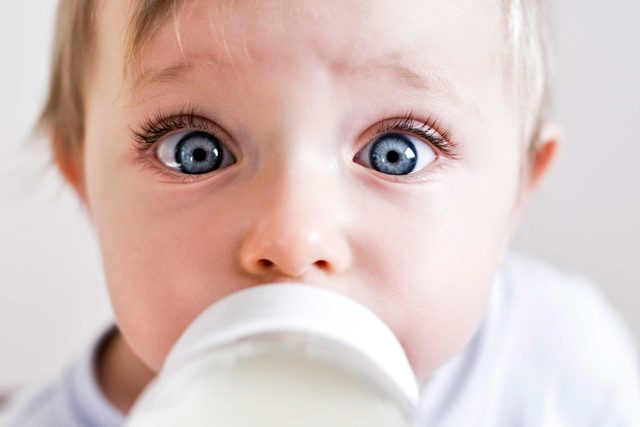
Your baby stares at you
Babies use every sense to learn about the world around them. The scent of his mother is one of the first things committed to a baby’s memory, as his very survival is dependent on its recognition. It makes sense then, that an infant would stare intently at his or her caregiver to memorize the face of the one that answers every cry, provides every feeding, and gives a feeling of security and comfort more than anyone else. Use these special moments of connection with your baby to deepen your bond by smiling at your little one and stroking his or her face. These early interactions promote social skills that your child will utilize the rest of his or her life. When your baby is staring at you as though you are the most interesting thing he or she has ever seen, know that this is a sign of not only love, but trust.
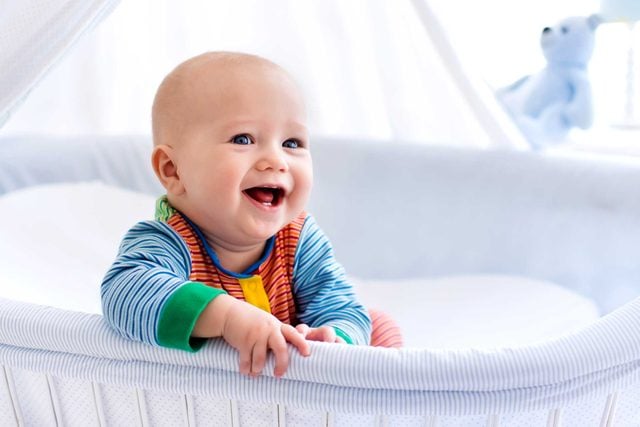
Your baby smiles and laughs
A happy baby is one with a secure attachment and strong trust in his or her caregivers. When a baby feels comfortable enough to smile and laugh with a caregiver, it is a sign of trust. An unsure or uncomfortable infant will often appear serious or hesitant, especially with strangers or those he or she is unfamiliar with. Fiore says of infant smiles and development of trust, “As babies grow, their social smiles are received by parents and caregivers as the ultimate reward! There is something tremendously heartwarming about an infant’s smile. When the baby’s needs are met consistently over time, a secure sense of trust is established. This doesn’t mean that the baby gets everything he wants the second he cries, but rather that the caregiver will indeed provide predictable support and tenderness, as well as firm resolve when it is in the baby’s best interest. These early trusting relationships provide a blueprint for future relationships.”
